
Most nonprofits are stuck using outdated grant writing methods that weren’t built for today’s competitive funding landscape. It’s time-consuming, overwhelming, and often leads to rejection.
So we tested 17 AI grant writing tools designed to streamline the grant writing process by generating compelling proposals, automating research, and increasing your success rates—without the usual learning curve.
Ready? Let’s go!
| Tool | Best For | Standout Feature | Starting Price |
|---|---|---|---|
| Grantboost | Smart learning and personalized memory | AI-powered grant proposal generation | Free, $19.99/mo (Pro) |
| ChatGPT | General AI writing assistance | Custom prompt flexibility | Free, $20/mo (Plus) |
| Claude AI | Technical grant writing | Advanced reasoning for complex topics | Free, $17/mo (Pro) |
| Jasper | Brand voice consistency | Brand voice training | $39/mo |
| Instrumentl | Grant research & management | Funder database integration | $179/mo |
| Notion | Collaborative grant development | Integrated workspace | $10/mo |
| Grammarly | Proposal refinement | Advanced grammar & style checking | Free, $12/mo (Premium) |
| Google Gemini | Data-driven grant development | Multimodal understanding | Free, $19.99/mo (Advanced) |
| GrantHub | Grant management & tracking | Comprehensive dashboard | $29/mo |
| GrantStation | Strategic funding research | Extensive funding database | $199/yr (1-year membership) |
| WriteSonic | SEO-optimized content | Factual accuracy | $49/mo |
| Wordtune | Refining grant language | Rewriting suggestions | Free (limited), $6.99/mo |
| Anyword | Donor-focused messaging | Predictive performance scoring | $49/mo |
| Grant Advance | Template-driven proposals | Document generators | $2,495/yr |
Efficiency & Time-Saving: We prioritized tools that significantly reduce the 30-50 hours typically spent on a single grant proposal
Quality of Output: We evaluated how well each writing tool creates compelling grant proposals that meet funder expectations
Ease of Use: We favored intuitive interfaces that don’t require technical expertise
Nonprofit Focus: We highlighted tools specifically designed for nonprofit grant writers
Read Next: Best Practices for Evaluating AI Software

Grantboost is an AI-powered grant writing platform designed specifically for nonprofits, aiming to streamline the grant proposal process and enhance efficiency.
What started as a beta tool rapidly grew to serve over 5,000 grant writing teams, processing more than 3.5 million words monthly.
Unlike general AI writing tools, Grantboost is specifically designed for nonprofit grant writing. The platform combines AI-powered proposal generation with an intuitive workflow designed to eliminate the most time-consuming aspects of the grant writing process.
AI-Powered Grant Writing: Generates tailored grant proposals based on your organization’s details and specific grant opportunities.
User-Friendly Inputs: Complete a simple survey about your team, mission, and funding goals to get started.
Grant Opportunity Analysis: Paste or input grant opportunity details, and Grantboost’s AI extracts and analyzes the information to craft effective responses.
Customizable Outputs: AI generates proposal drafts based on industry best practices, with easy editing options to align with your organization’s voice.
Personalized Memory: Writes more like you the more that you use it. Saving time with smarter responses.
Grantboost offers a freemium model with three tiers:
Free: Access to basic templates and 40 monthly AI boosts
Pro: $19.99/month for unlimited AI access, grant application tracking, and template access
Teams: $29.99/month for multiple users, priority support, and advanced collaboration features
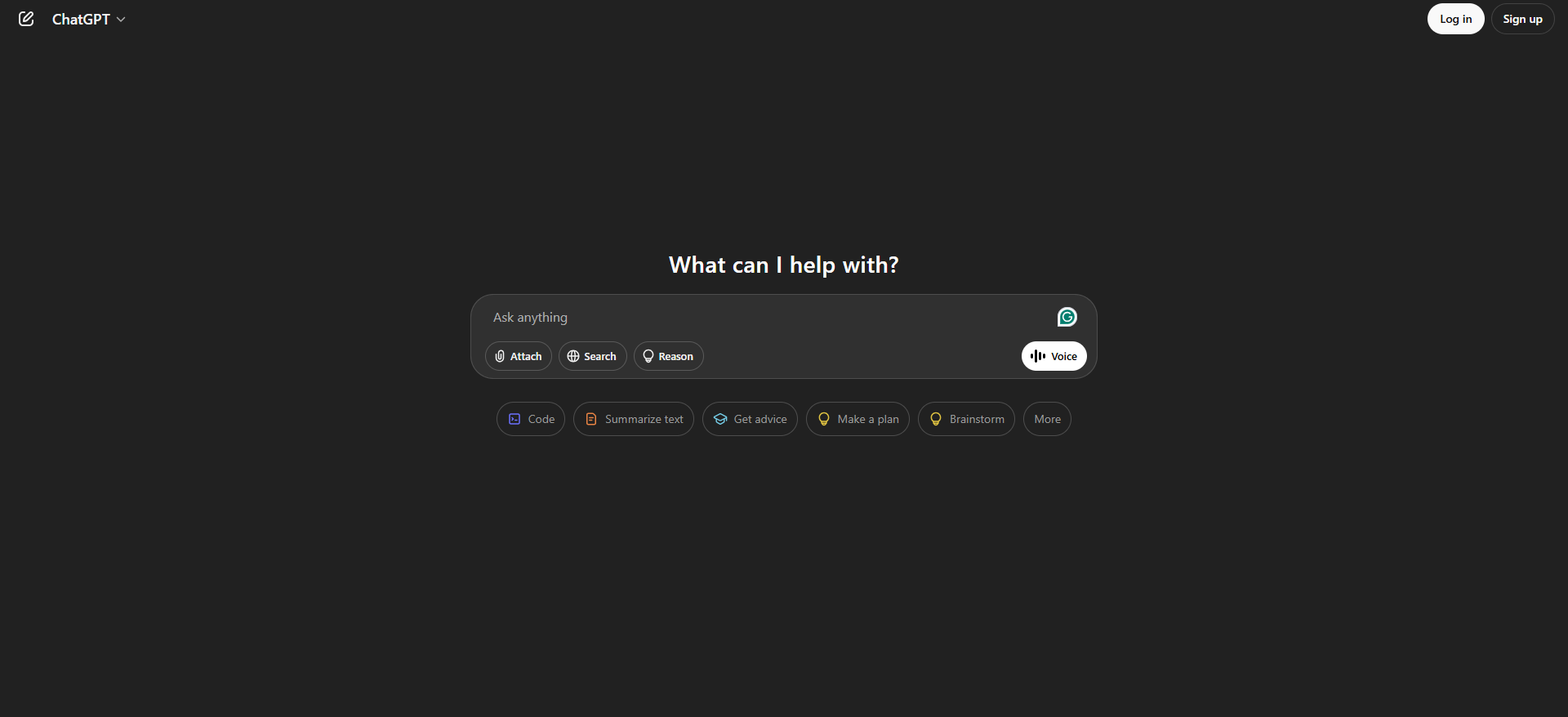
ChatGPT is the world’s most widely used AI assistant. While not specifically designed for grants, its flexibility makes it a popular tool among resource-constrained nonprofits.
Custom Prompt Flexibility: ChatGPT responds to detailed instructions, allowing you to specify tone, format, and content requirements for different grant sections.
Research Assistance: Can help gather information about potential funders and summarize key requirements from grant guidelines.
Content Improvement: Excels at rewriting and refining existing content to improve clarity, persuasiveness, and alignment with funder priorities.
Brainstorming Support: Helps generate ideas for program descriptions, impact measurements, and addressing application questions from multiple angles.
24/7 Availability: Provides instant assistance whenever inspiration strikes or deadlines loom.
ChatGPT requires well-crafted prompts to produce useful grant content. You’ll need to provide detailed context about your organization and the specific grant opportunity. The quality of output depends heavily on how well you can articulate what you need.
Additionally, ChatGPT may occasionally generate inaccurate information or misunderstand complex nonprofit terminology. All content should be carefully reviewed by someone familiar with your organization and the grant requirements.
Free tier: Basic access with potential usage limits during peak times
ChatGPT Plus: $20/month for priority access, faster responses, and access to GPT-4 capabilities
Read Next: ChatGPT for Grant Writing - Unleashing AI to Transform Nonprofit Fundraising
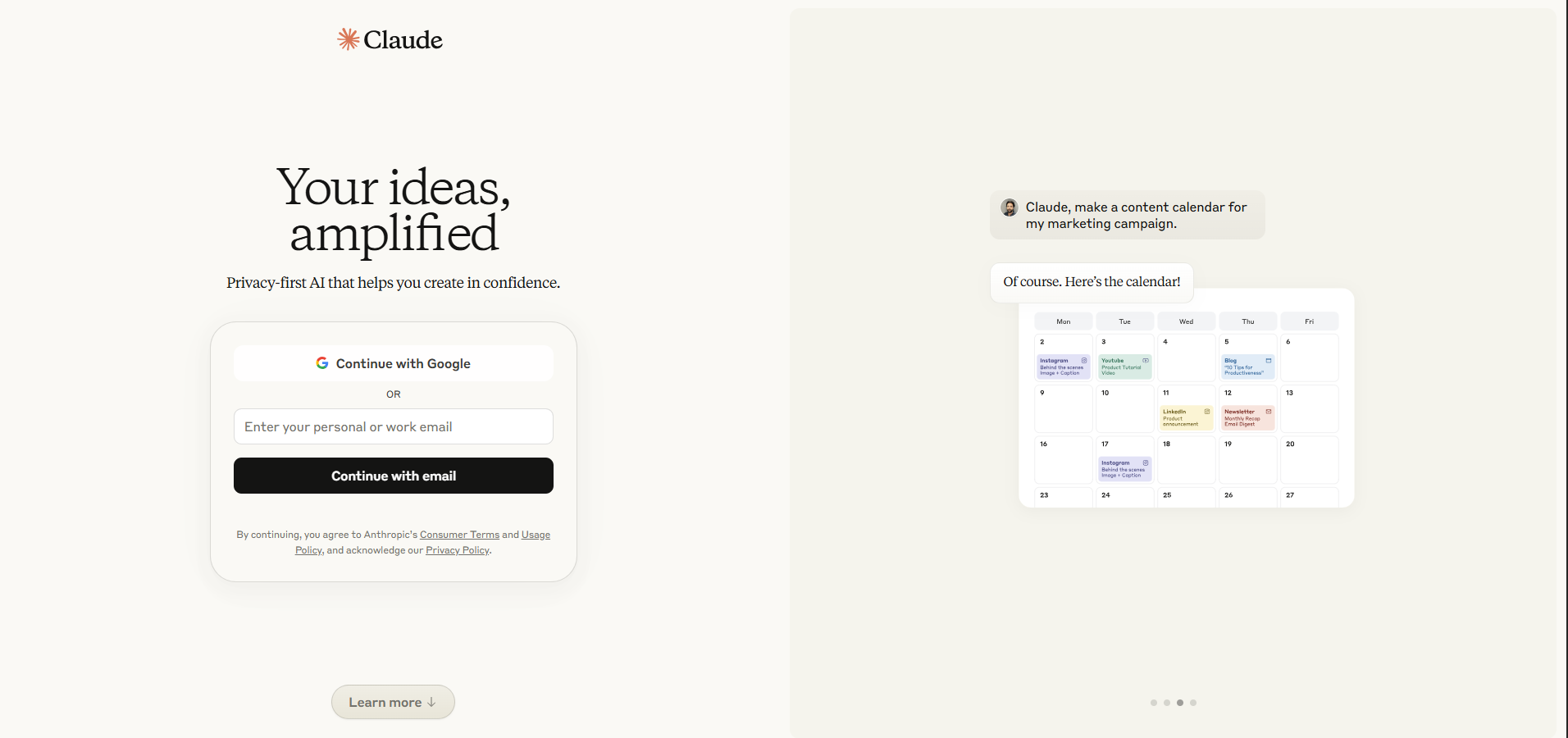
Claude excels at maintaining consistency throughout longer documents and handling complex, nuanced topics that require careful explanation—perfect for grants requiring detailed methodology or evaluation plans.
Advanced Reasoning: Exceptional at crafting logically structured arguments and technical explanations for complex program models or intervention strategies.
Contextual Understanding: Maintains awareness of previous information throughout long grant narratives, ensuring consistency across all sections.
Research Integration: Effectively incorporates research findings and evidence-based practices into grant narratives to strengthen proposals.
Ethical Considerations: Designed with a focus on helpful, harmless, and honest outputs, reducing the risk of generating misleading content.
Data Analysis Support: Helps interpret program data and translate findings into compelling impact statements for grant proposals.
While Claude excels at technical writing, it may require more specific guidance for capturing your organization’s unique voice and mission. The interface is also somewhat less intuitive than ChatGPT for first-time users.
As with all AI tools, Claude’s outputs should be carefully reviewed for accuracy and alignment with your organization’s actual programs and capabilities.
Claude Free: Basic access with some usage limitations
Claude Pro: $17/month for priority access during high usage periods, higher message limits, and faster response times
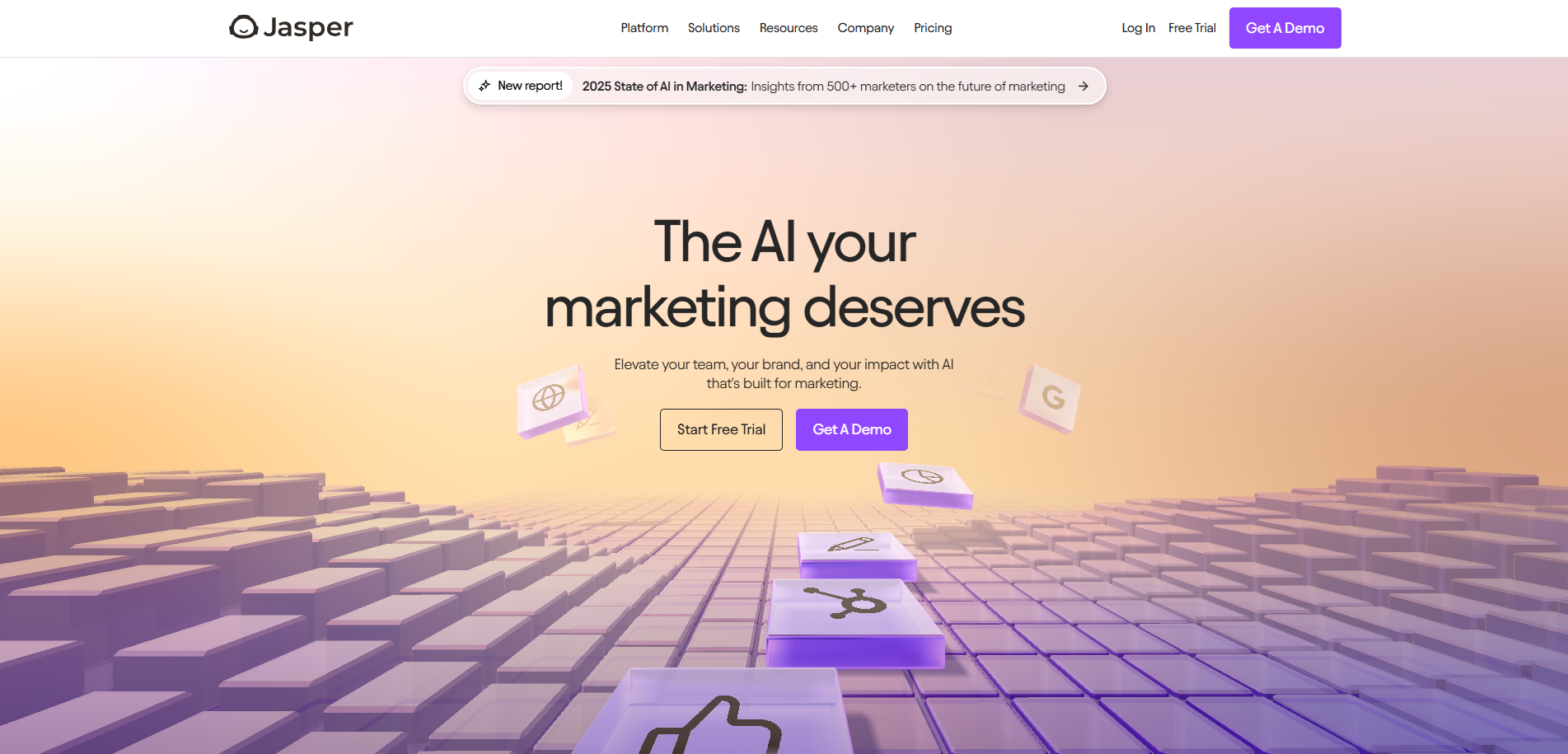
Founded in 2021 as Jarvis and later rebranded, Jasper has become a leading AI platform for marketing-focused content creation. While primarily designed for marketing teams, Jasper’s emphasis on brand voice consistency makes it valuable for nonprofits wanting to maintain a cohesive narrative across all grant applications.
Brand Voice Training: Jasper can be trained on your existing content to learn and replicate your organization’s unique communication style across all grant materials.
Templates and Frameworks: Offers pre-built templates that can be adapted for common grant sections like executive summaries, program descriptions, and impact statements.
Collaborative Workspace: Enables team members to collaborate on grant proposals with shared access to AI tools and content libraries.
SEO Optimization: While primarily a marketing feature, this can help ensure your online grant materials and program descriptions use relevant keywords that align with funder interests.
Chrome Extension: Allows you to generate drafts or refine content directly within grant application portals or shared documents.
Jasper’s marketing focus means you’ll need to carefully adapt its features for grant writing purposes. The platform has a steeper learning curve than some alternatives, and its higher price point may be prohibitive for smaller nonprofits.
The emphasis on persuasive marketing language may need to be toned down for more formal grant applications, particularly for government or academic funders.
Creator: $39/month per seat, includes basic AI writing features and one Brand Voice
Pro: $59/month per seat, adds team collaboration features and multiple Brand Voices
Business: Custom pricing for enterprise-level needs and advanced features
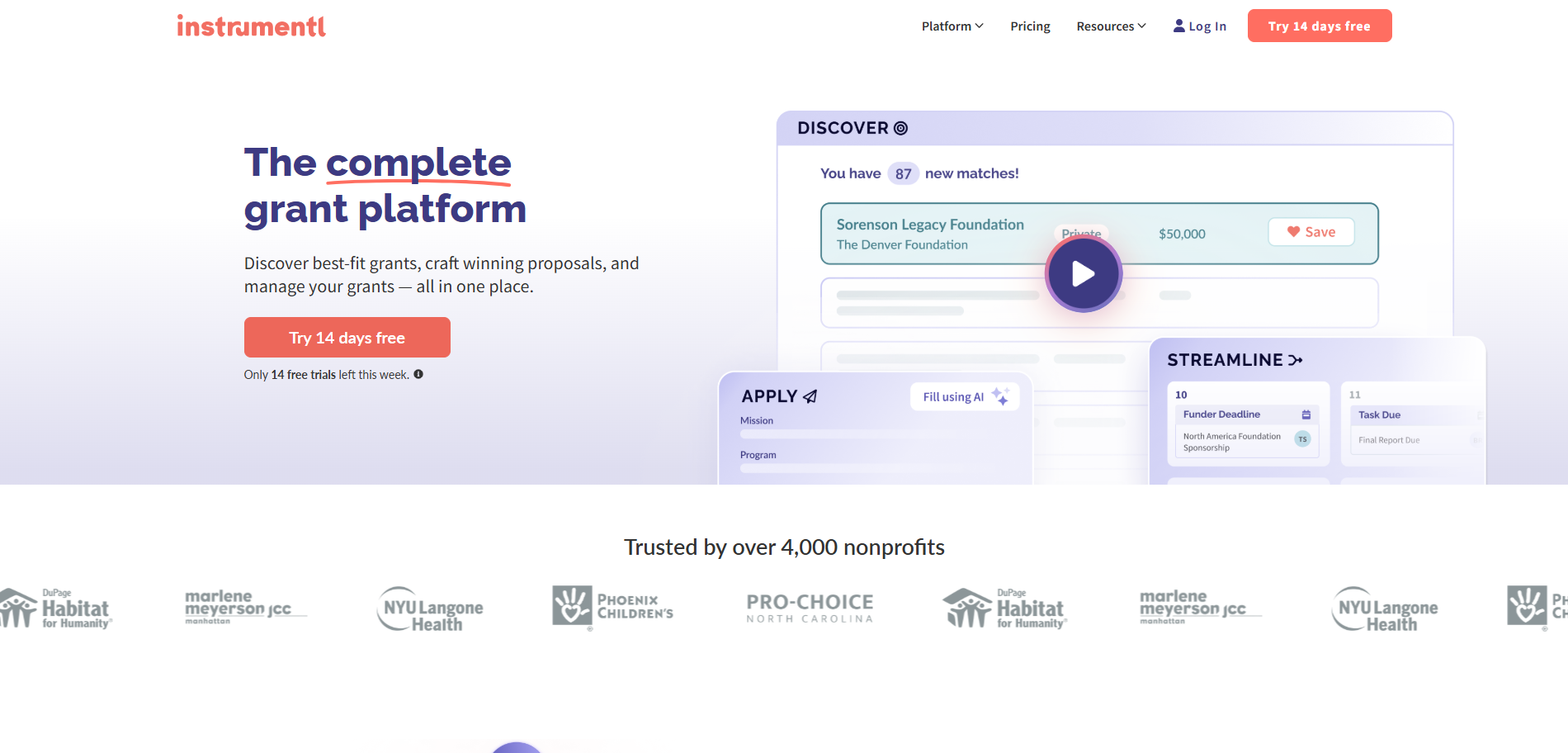
Instrumentl is a grant platform that helps nonprofits quickly discover relevant funding opportunities, apply for grants, and manage the entire process in one place.
With a focus on efficiency, it connects users to a wide range of curated grants and funding sources, while features like peer prospecting give insights into who is supporting similar organizations
Funder Database Integration: Access a large database of over 400,000 funders and 20,000 active grants. AI helps match your organization with relevant funding opportunities.
Document Library: Securely store past proposals and boilerplate content that AI can use when drafting new applications.
Project Tracking: Manage deadlines, tasks, and responsibilities across your team throughout the grant process.
Automated Deadline Reminders: Never miss application deadlines or reporting requirements with automated reminders.
Instrumentl’s comprehensive approach comes at a higher price point that may be challenging for smaller nonprofits. The platform’s robust feature set also means a steeper learning curve for new users.
While the AI writing features are promising, they’re newer additions to the platform and may not be as refined as tools focused exclusively on content generation.
Basic: $179/month (billed annually) for organizations with budgets under $500k
Standard: $299/month (billed annually) with expanded features
Pro: $499/month (billed annually) adding personalized onboarding and integrations
Advanced: $899/month (billed annually) for large organizations needing extensive collaboration
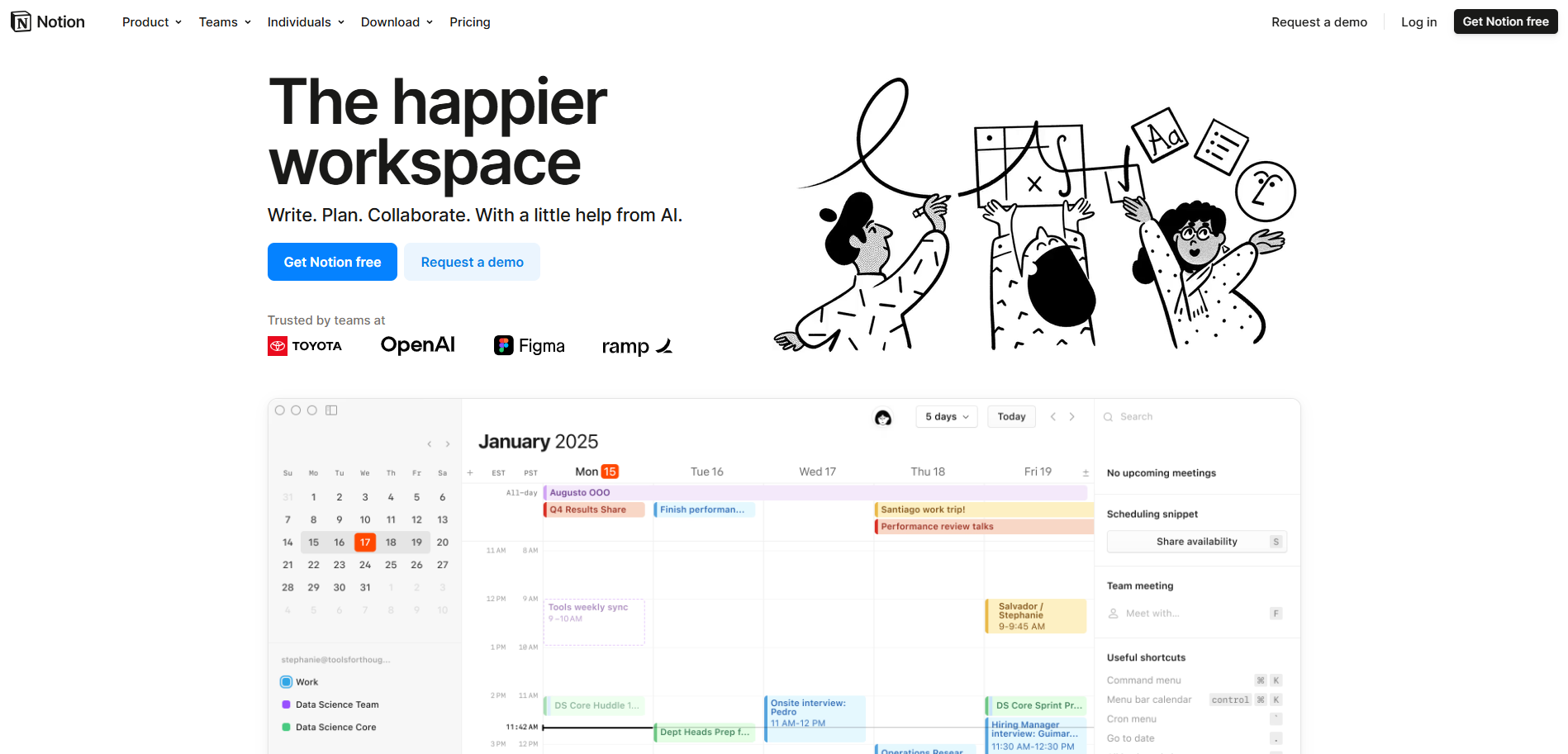
Notion AI integrates artificial intelligence directly into Notion’s flexible workspace environment.
What sets Notion AI apart is how seamlessly it combines document organization, team collaboration, and AI assistance in one platform, making it ideal for nonprofits that need to coordinate multiple stakeholders in the grant development process.
Integrated Workspace: Combines grant writing, project management, and team collaboration in a single platform that keeps everything organized.
AI Writing Assistance: Generates and refines content directly within your grant documents, with commands for summarizing, expanding, improving, or changing the tone of text.
Document Templates: Customizable templates for grant proposals, budgets, timelines, and other essential documents that can be reused across applications.
Knowledge Management: Creates a centralized repository of your organization’s programs, impact data, and boilerplate content that can be easily referenced and inserted into proposals.
Notion has a learning curve for teams not already familiar with the platform. The AI features are integrated into the broader Notion ecosystem, so you’ll need to adopt the entire platform rather than just using the AI components.
While powerful for organization and collaboration, Notion AI’s writing capabilities aren’t as specialized for grant writing as some dedicated tools like Grantboost!
Notion Basic: Free for personal use with limited features
Notion AI: $10/member/month (billed annually) or $12/member/month (billed monthly)
Team and Enterprise plans: Available with additional features for larger organizations
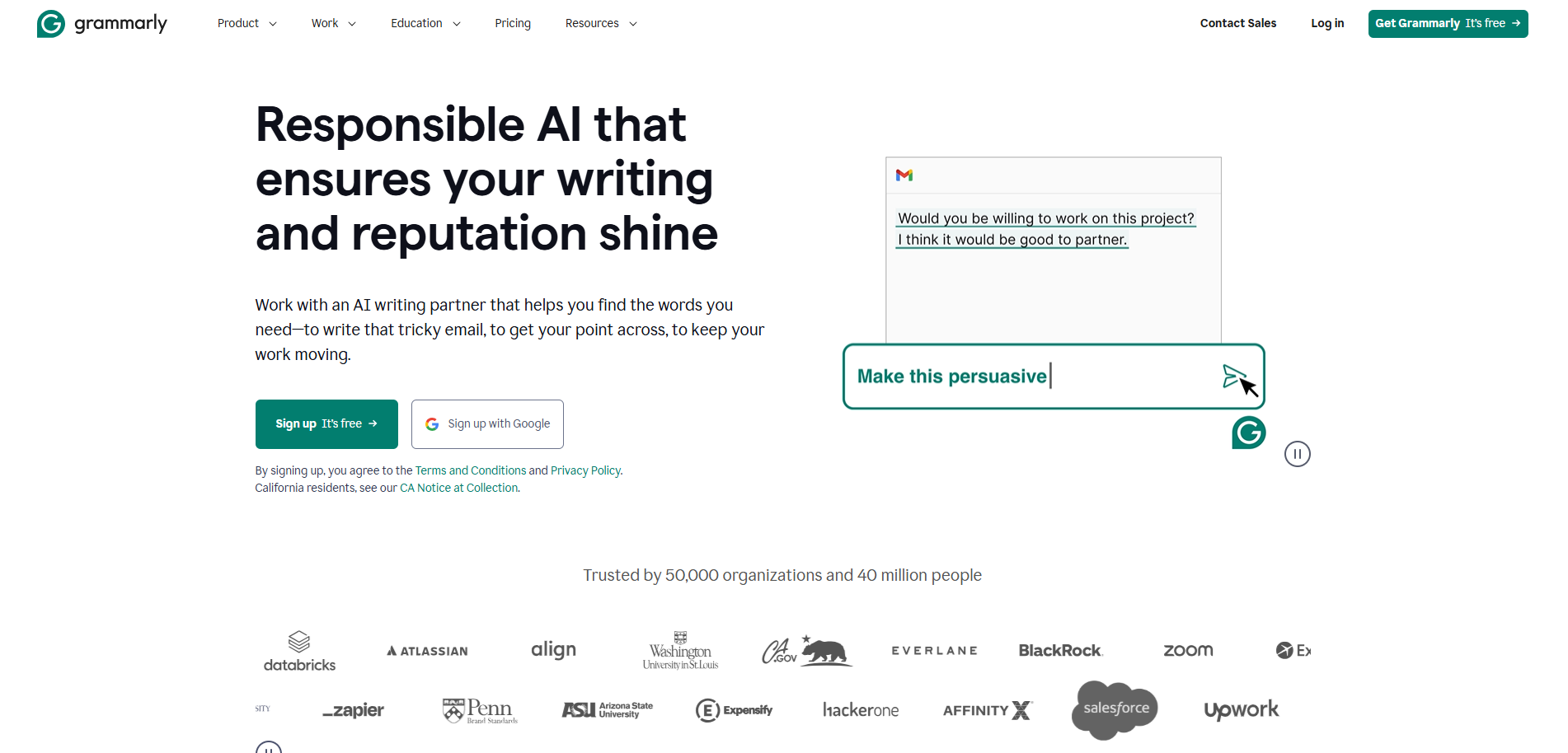
Founded in 2009, Grammarly has evolved from a simple grammar checker to an AI-powered writing assistant used by over 50,000 organizations. While not grant-specific, Grammarly helps nonprofits ensure their proposals are clear, professional, and error-free.
Grammarly stands out for its ability to not just correct errors but improve the overall quality, tone, and impact of your writing. It’s essential for creating grant proposals that impress funders in a way that doesn’t intefere with your natural writing style.
Advanced Grammar and Style Checking: Goes beyond basic spell-check to identify complex grammar issues, wordiness, passive voice, and other writing problems that could weaken your proposal.
Tone Adjustment: Analyzes and helps modify the tone of your writing to match the formality and style expected by different funders.
Clarity Improvements: Suggests ways to make complex program descriptions and technical information more accessible to grant reviewers.
Plagiarism Detection: Ensures your proposal doesn’t inadvertently contain text too similar to other sources or your previous applications.
Browser Extension and Integration: Works directly in grant portals, Google Docs, Microsoft Word, and other writing platforms.
Grammarly focuses on improving existing content rather than generating new material. You’ll still need to create the initial draft of your grant proposal.
While excellent for general writing improvement, Grammarly lacks specialized knowledge of grant writing conventions or nonprofit terminology.
Free: Basic writing suggestions and corrections
Premium: $12/month per user (billed annually, $30 if paid monthly) for advanced features including tone adjustment and clarity enhancements
Business: Custom pricing for team features and administrative controls
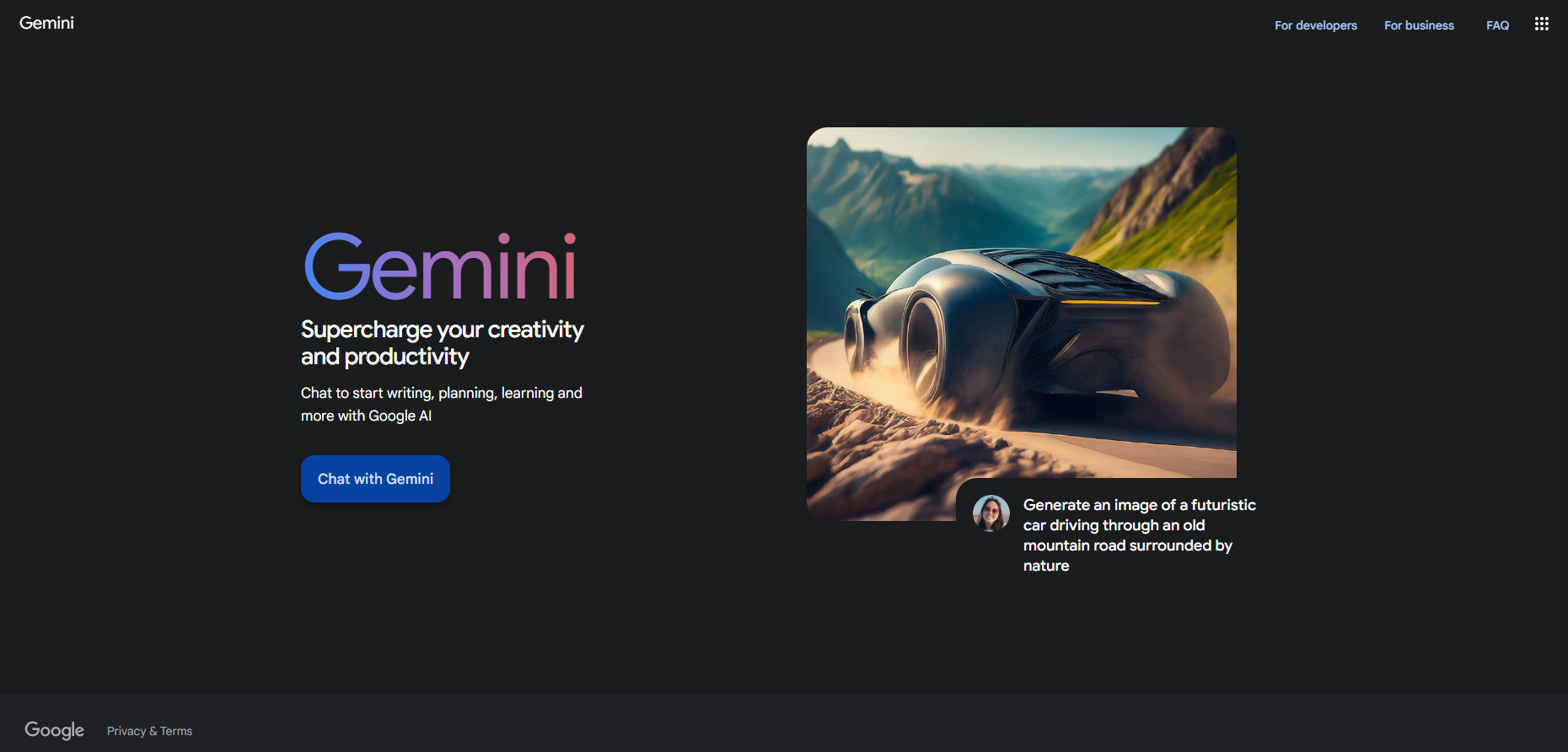
Launched in 2023 as the successor to Google Bard, Gemini represents Google’s most advanced AI system. It excels at integrating real-time information and data analysis into grant narratives for teams needing to incorporate current research and statistics.
Gemini distinguishes itself through seamless integration with Google’s ecosystem and its ability to process multiple types of information (text, images, data) to enhance grant proposals.
Multimodal Understanding: Can analyze text, images, and data together, helping translate program outcomes into compelling visual narratives for grants.
Real-Time Information: Accesses current information through Google Search, ensuring your proposals include the latest relevant statistics and research.
Google Workspace Integration: Works within Google Docs, Sheets, and other Google tools commonly used by nonprofits for grant development.
Data Visualization Assistance: Helps create charts and graphs to represent program outcomes and community needs in visually compelling ways.
Multilingual Capabilities: Supports grant writing in multiple languages, valuable for international organizations or those serving diverse communities.
As a newer AI system, Gemini is still evolving and may have inconsistencies in output quality. Its integration benefits are strongest for organizations already using Google Workspace tools.
Like other general AI assistants, Gemini requires clear guidance to produce grant-specific content that meets professional standards.
Gemini Free: Basic access to AI features
Gemini Advanced: $19.99/month for access to more powerful AI models and additional features
Google Workspace AI add-on: Available as part of Google Workspace subscriptions
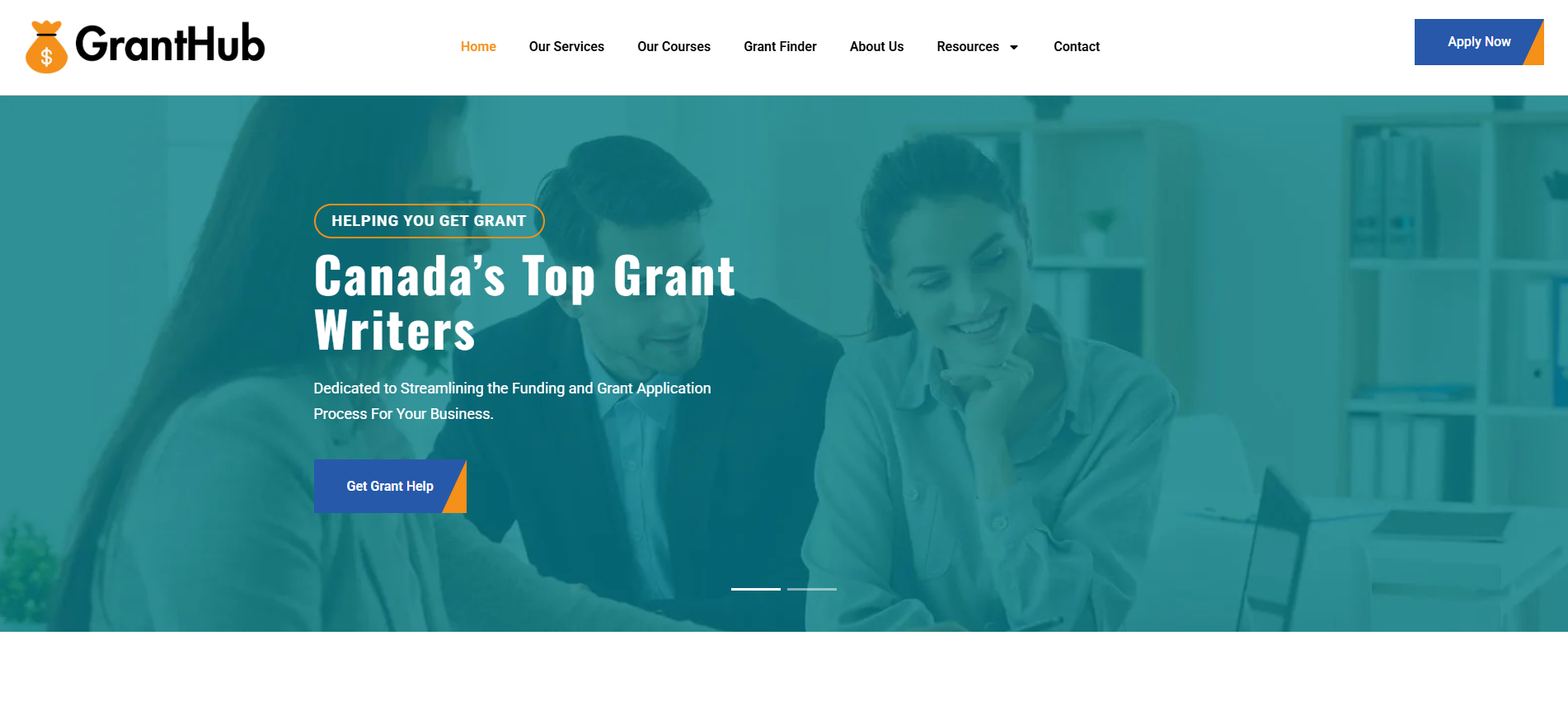
GrantHub is a trusted grant management solution for thousands of nonprofits. While not primarily an AI writing tool, its comprehensive tracking and management features complement AI writing assistants by organizing the entire grant process.
GrantHub excels at bringing structure and visibility to the often chaotic grant application process, ensuring deadlines are met and nothing falls through the cracks.
Grant Tracking: Comprehensive dashboard for monitoring all active and potential grant opportunities, deadlines, and requirements.
Task Management: Assigns responsibilities and timelines to team members for each stage of the grant writing process.
Document Storage: Centralized repository for all grant-related documents, including proposals, budgets, and supporting materials.
Reporting Tools: Generates reports on grant activities, success rates, and funding sources to inform strategic planning.
Funder Relationship Management: Tracks communications and relationships with funders to strengthen connections over time.
GrantHub focuses on management rather than content creation, so you’ll need to pair it with AI writing tools for a complete solution. The platform has a significant learning curve and requires consistent use to realize its full benefits.
For very small nonprofits with limited grant activity, the structured approach may feel like overkill compared to simpler tracking methods.
The pricing starts at $29/mo and scales to $89/mo
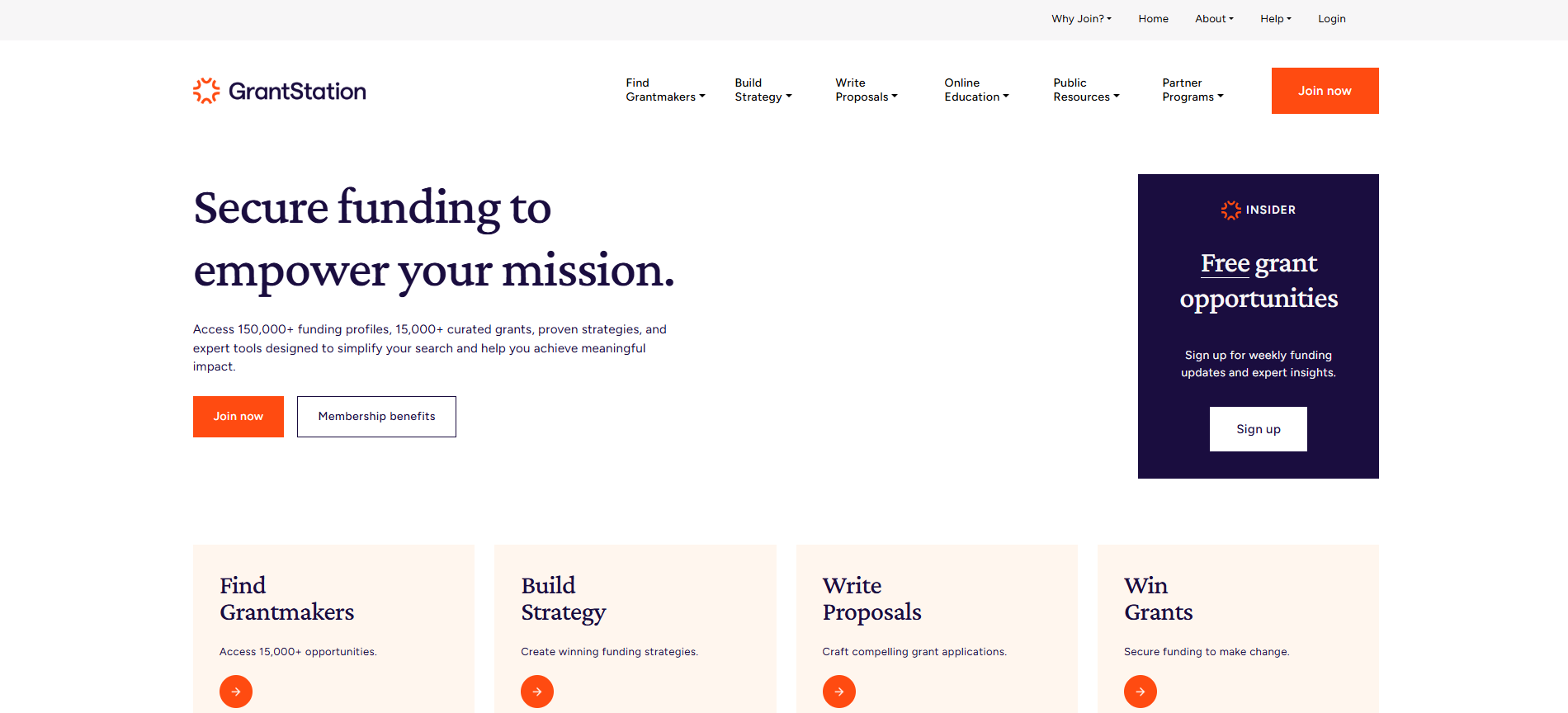
GrantStation is a leading database of grant opportunities with thousands of funding sources available. It stands out for its combination of comprehensive funding data and strategic resources that help nonprofits develop long-term, sustainable funding approaches.
Extensive Funding Database: Access to over 15,000 curated grants and 150,000+ funding profiles, updated regularly to ensure accuracy and relevance.
Strategic Planning Tools: Provides templates and guides to help nonprofits create long-term, comprehensive funding strategies, not just individual grant applications.
Detailed Funder & Grant Profiles: In-depth insights into funders, including their priorities, past grants, and specific application guidelines, to help tailor your approach.
Online Training & Education: Access to webinars, tutorials, and expert articles on effective grant writing, strategic planning, and nonprofit development to strengthen your skills.
GrantStation excels at helping you identify grant opportunities but offers limited assistance with the actual writing process. You’ll need to combine it with other resources for proposal development.
The database, while extensive, may include some opportunities that aren’t actively accepting applications, requiring additional verification before investing time in applications.
One-Year Membership: $199 USD (regular price $699)
Two-Year Membership: $299 USD
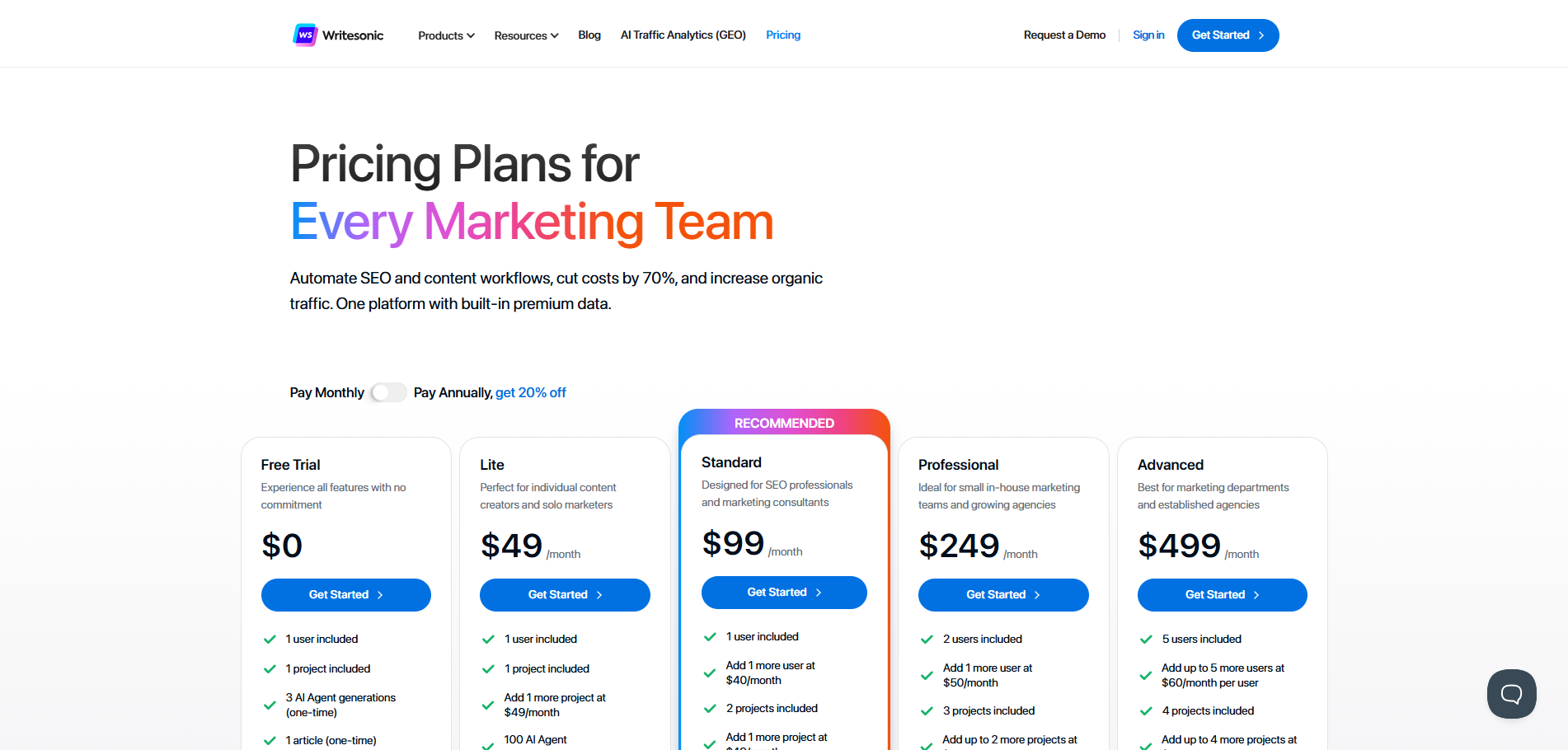
WriteSonic specializes in creating SEO-optimized content, which can benefit nonprofits seeking to enhance their online presence for potential funders.
Factual Accuracy: WriteSonic emphasizes factual accuracy in its generated content.
SEO Optimization: The tool helps create online content that improves visibility to potential funders.
Content Repurposing: WriteSonic can help repurpose successful grant content for different channels.
Multiple Content Formats: The platform supports various content types that can complement grant applications.
Paid tiers start at $49 and scale to $499.
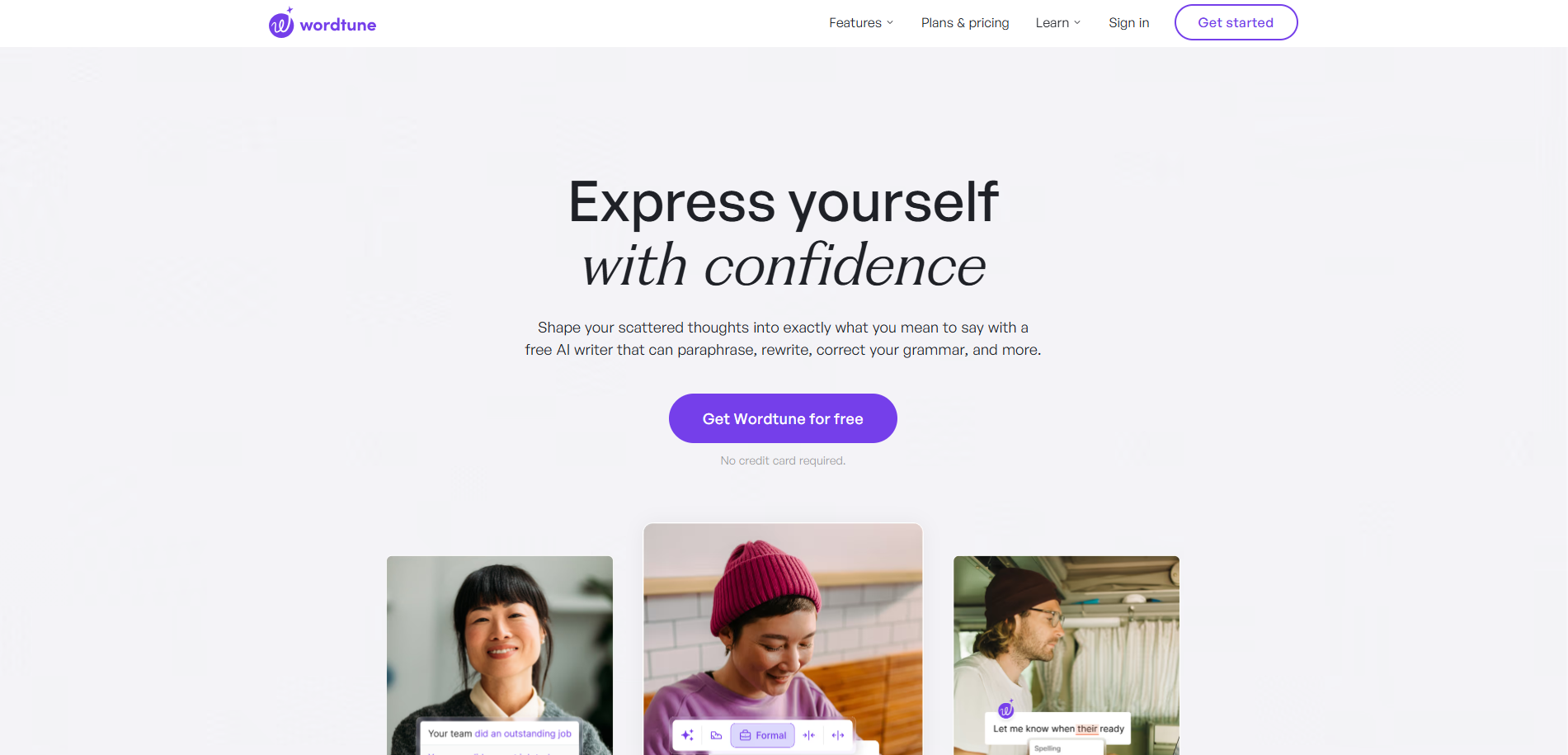
Wordtune has gained recognition as a sophisticated AI writing assistant focused on helping users find the perfect wording. For grant writers, it offers a way to fine-tune language for maximum impact without changing the core message.
Wordtune excels at improving clarity and impact rather than generating content from scratch, making it ideal for refining grant proposals after the initial draft is complete.
Rewriting Suggestions: Offers multiple alternatives for sentences and paragraphs while preserving your original meaning and intent.
Tone Adjustment: Adapts your writing to be more formal, casual, or persuasive depending on the funder’s preferences.
Length Control: Condenses verbose explanations or expands on key points to meet specific word count requirements.
Vocabulary Enhancement: Suggests more precise or impactful word choices to strengthen your grant narrative.
Browser Extension: Works directly in grant portals, Google Docs, and other web-based writing platforms.
Wordtune focuses on refining existing content rather than creating new material from scratch. You’ll need to pair it with other tools or approaches for initial content generation.
The free version has significant usage limitations, while the premium features that are most useful for grant writing require a subscription.
Pricing starts at $0.
Basic Plan: Free with limited daily usage (10 rewrites)
Advanced Plan: $6.99/month (billed annually) with increased limits (30 rewrites daily)
Unlimited Plan: $9.99/month (billed annually) for unlimited rewrites and premium features
Teams Plan: $7.99/seat/month (billed annually) for organizational use
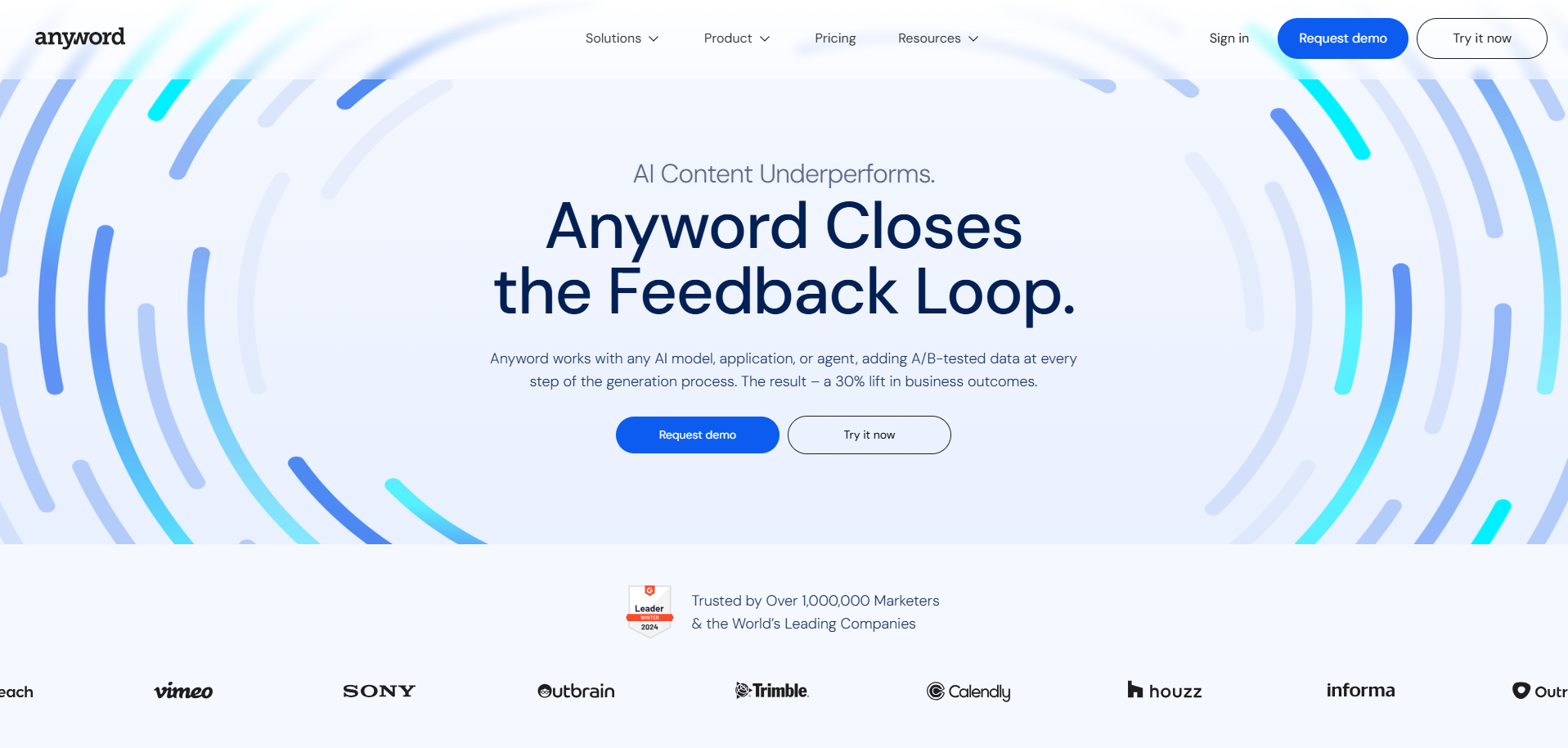
Anyword specializes in creating persuasive marketing copy with predictive performance scoring, helping craft compelling calls to action and donor communications.
Predictive Performance Scoring: Anyword evaluates content for potential engagement.
Donor Persona Targeting: The platform can tailor content to specific donor demographics.
A/B Testing Support: Anyword generates multiple content variations for testing.
Call-to-Action Optimization: The tool excels at creating compelling calls to action.
Anyword’s marketing focus makes it more suitable for fundraising communications than formal grant proposals.
Unlike Grantboost, which is specifically designed for grant writing, Anyword lacks specialized features for grant applications. It works best as a complementary tool within a broader content strategy that includes dedicated grant writing solutions like Grantboost.
The pricing starts at $49/mo and scales to $499/mo
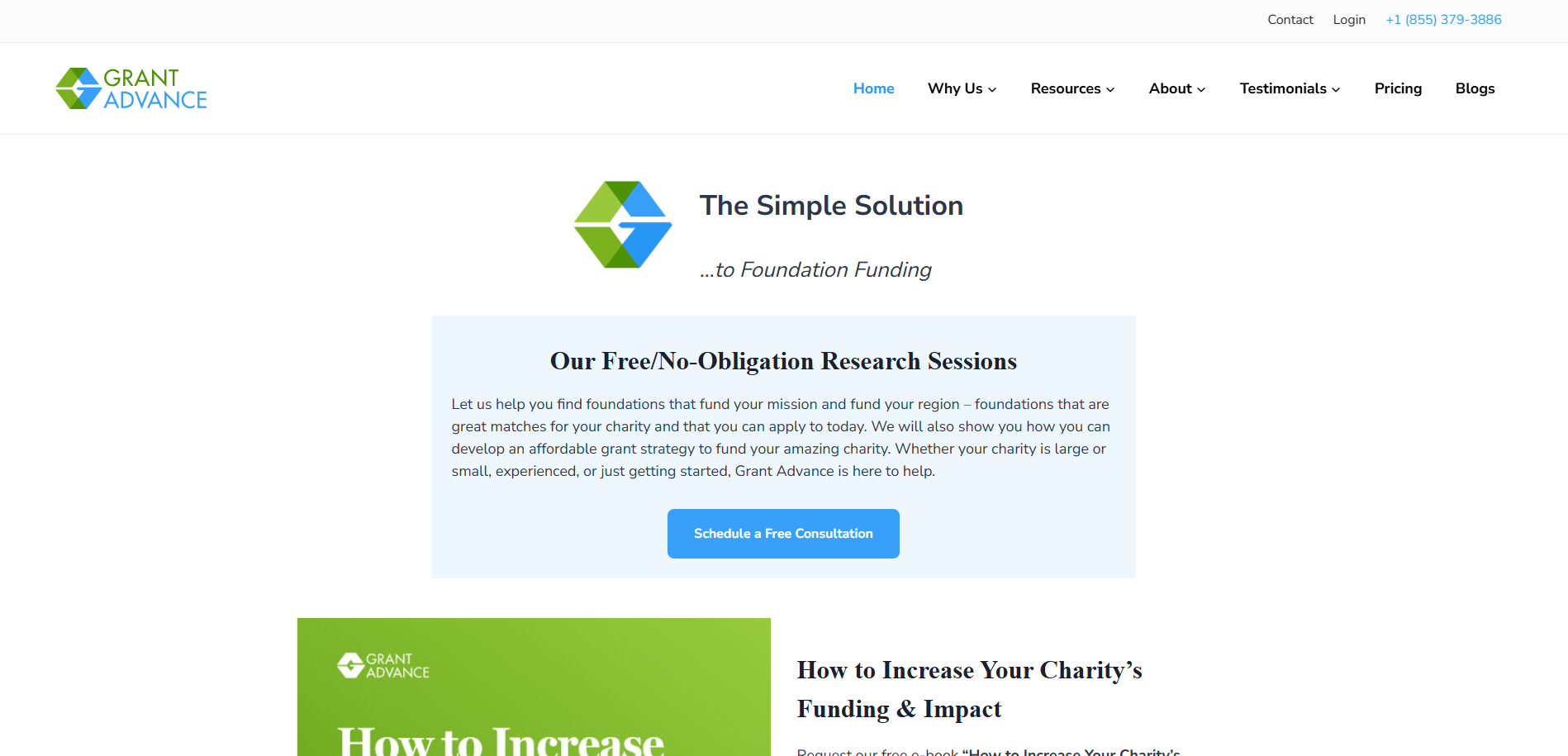
Grant Advance is designed to simplify the grant application process with a comprehensive suite of tools that helps charities secure funding effectively. The platform provides document generators, grant research engines, and connection-building resources that go beyond traditional fundraising.
Document Generators: Easily create professional grant proposals, letters of inquiry, and other essential documents using the platform’s customizable templates.
Grant Search Engines: The platform provides access to over 82,000 US foundations, enabling users to research potential funding sources based on location, past grants, and other criteria
Campaign Manager: Organizes and tracks multiple fundraising campaigns, allowing you to coordinate efforts and track the progress of your applications in one place.
Grant Secretary: Automates the final stages of grant applications, ensuring your submissions are formatted correctly and prepared for submission without any hassle.
Relationship Building Tools: Beyond templates and research, Grant Advance emphasizes the importance of building relationships with foundation directors. The platform provides tools to help charities connect with key individuals who can support their cause.
Cost: Grant Advance is a premium tool with a significant financial investment compared to some alternatives. Memberships are offered annually, with no monthly subscription option.
Learning Curve: Some users may find the platform’s range of tools to require a learning period, especially if they are new to using grant management software.
The Launch: $2,495 for a 1-year membership (1 user)
The Build: $4,995 for a 3-year membership (3 users)
The Future: $5,995 for a 5-year membership (5 users)
Read Next: We Tested AI Grant Writing Companies that are Cheaper - Here’s #1
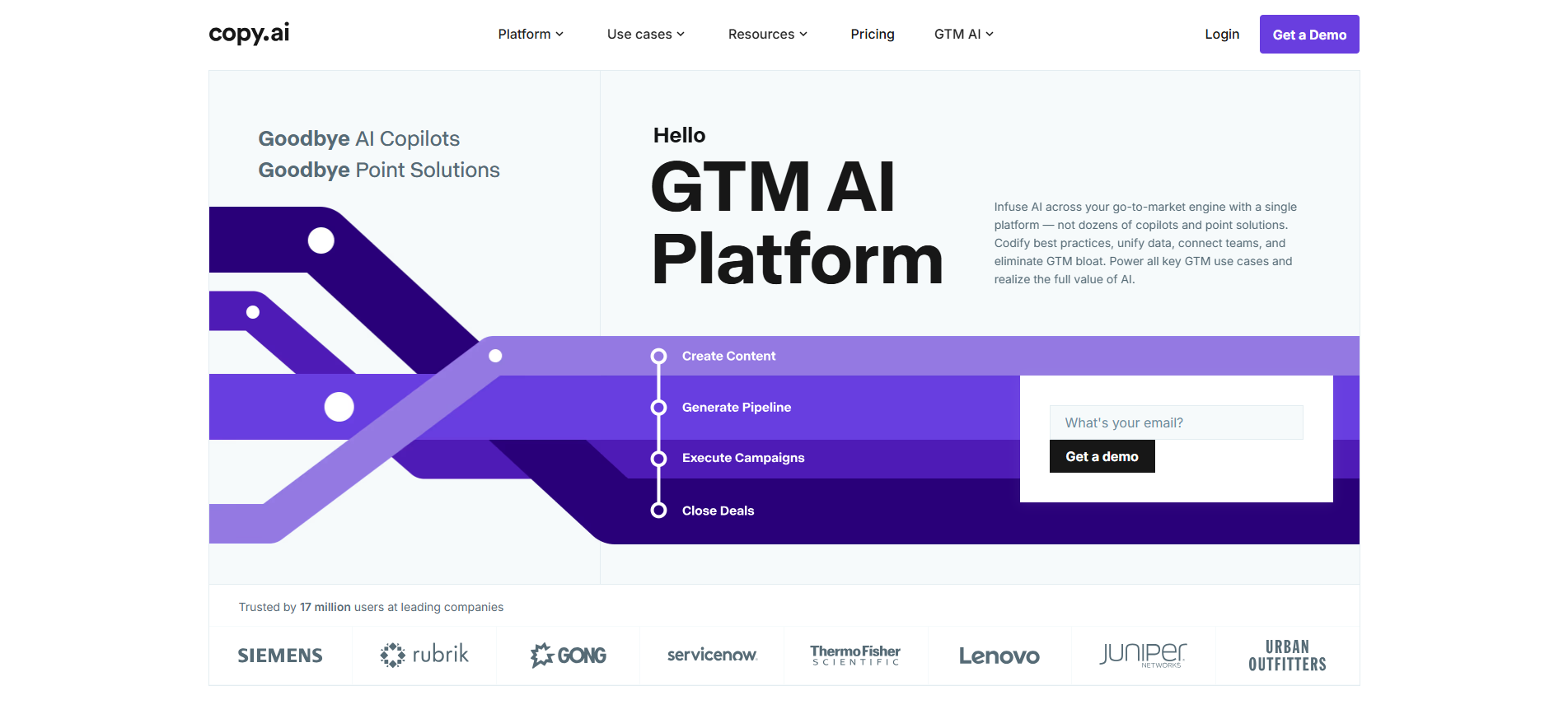
Copy.ai excels at quickly generating short-form content like executive summaries, program descriptions, and impact statements that can be incorporated into larger grant proposals.
Template Variety: Offers numerous templates that can be adapted for different sections of grant proposals.
Quick Generation: Produces content rapidly based on minimal input, ideal for getting past writer’s block or generating initial drafts.
Tone Customization: Adjusts writing style to match different funders’ preferences, from formal to conversational.
Collaborative Workspace: Allows team members to share and build upon AI-generated content.
Browser Extension: Generates content directly within grant portals and other websites.
Copy.ai’s business focus means its templates aren’t specifically designed for grant writing and may require significant adaptation. The platform excels at short-form content but may struggle with the nuanced, detailed narratives often required in comprehensive grant proposals.
Output quality varies based on the quality and specificity of your inputs.
Free Plan: Limited to 2,000 words per month
Pro Plan: $49/month for unlimited words
Enterprise: Custom pricing for larger teams and advanced needs
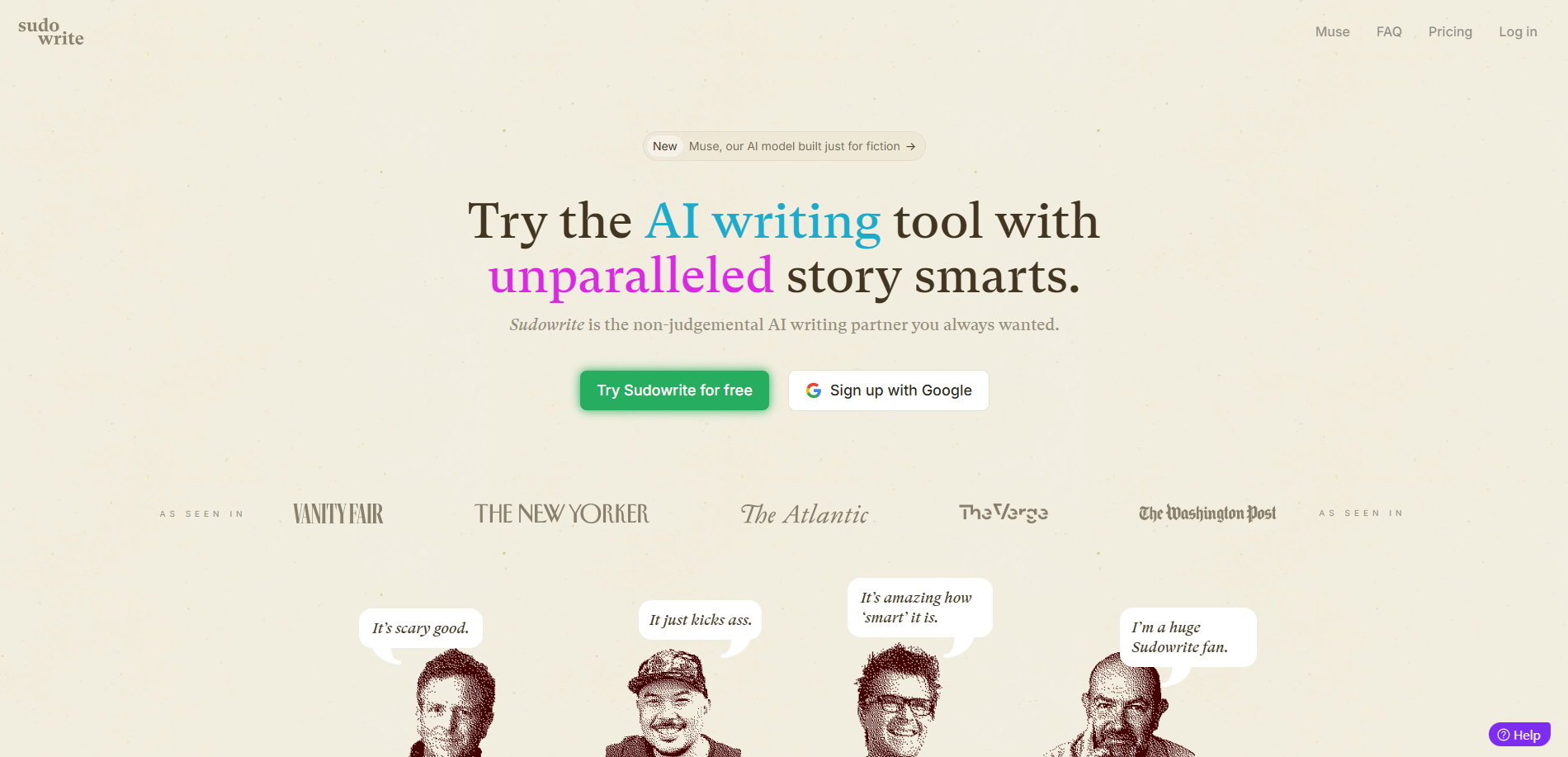
Sudowrite was designed for creative writing but has applications for crafting compelling narratives in grant proposals, particularly for impact statements and beneficiary stories.
Narrative Development: Sudowrite excels at creating engaging stories that illustrate program impact.
Character Development: The tool can help craft compelling beneficiary profiles.
Emotional Resonance: Sudowrite specializes in creating content with emotional depth.
Creative Problem-Solving: The platform offers creative approaches to describing complex social problems.
Sudowrite’s creative focus makes it suitable primarily for narrative sections of grant proposals rather than technical or budgetary components.
Unlike Grantboost, which provides comprehensive support for all aspects of grant proposals, Sudowrite is limited to storytelling elements. Its outputs often require adaptation to match the formal tone expected in grant applications, making it better as a supplementary tool than a primary grant writing solution.
The pricing starts at $19/mo and scales to $59/mo
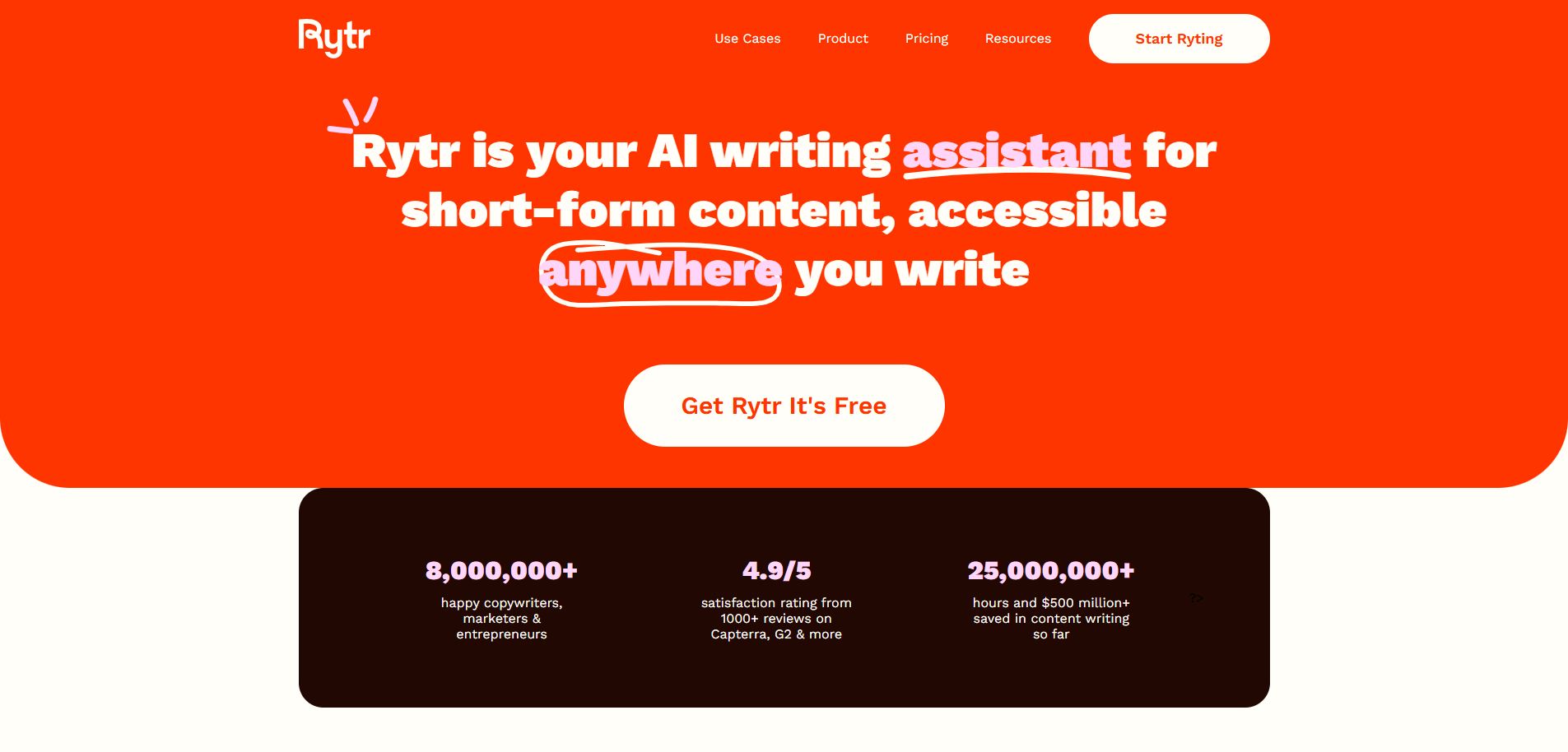
Rytr offers affordable AI writing assistance with support for multiple languages, making it accessible for small nonprofits and those working in multilingual communities.
Multilingual Support: Rytr can generate content in 35 languages.
Use Case Templates: While not grant-specific, Rytr offers various templates that can be adapted.
Tone Customization: The platform allows adjustment of content tone to match different requirements.
Budget-Friendly: Rytr’s affordable pricing makes it accessible to small nonprofits.
Rytr lacks specialized grant writing features and templates that Grantboost provides. While its multilingual support is valuable for diverse communities, its outputs generally require significant editing to meet the formal requirements of grant proposals.
Rytr’s general-purpose approach means it doesn’t incorporate grant writing best practices or nonprofit-specific guidance like Grantboost does.
Rytr offers a free plan with limited usage (10,000 characters per month) and a Premium plan at $9/month for unlimited usage.
An Unlimited plan at $29/month adds additional features for teams.
When using AI tools for grant writing, follow these ethical guidelines:
Be transparent with funders when appropriate about AI use
Verify all information generated by AI tools
Customize outputs to reflect your organization’s unique voice and perspective
Don’t misrepresent capabilities or outcomes in AI-generated content
Maintain human oversight throughout the process
| Stage | Human Role | AI Role |
|---|---|---|
| Planning | Define strategy, goals, and key messages | Suggest potential approaches based on successful grants |
| Research | Identify program strengths and community needs | Gather supporting statistics and funder information |
| Drafting | Provide organization-specific details and context | Generate initial content based on specific prompts |
| Editing | Review, personalize, and verify accuracy | Refine language, improve clarity, and suggest alternatives |
| Finalization | Ensure proposal aligns with organizational voice | Check for consistency, formatting, and completeness |
Read Next:
The best nonprofits don’t rely on just one tool—they build a stack that covers all key aspects of the grant seeking process. Here’s a quick breakdown to help you decide what to try first:
When you’re completely transforming your grant writing process: Start with Grantboost—it’s built specifically for nonprofits and offers the most comprehensive grant-specific AI assistance.
When you’re looking for a free, versatile option: ChatGPT or Claude AI provide excellent starting points, with Claude excelling for technical grants and ChatGPT offering more general flexibility.
Whichever direction you go, the tools on this list can dramatically reduce the 30-50 hours typically spent on each grant proposal,giving your nonprofit more time to focus on what really matters: your mission and impact.
For individuals and teams looking to secure more funding with less effort. Streamline your grant-writing process, stay organized, and achieve better results with proven templates and AI-driven support.